Unit 1 What's the matter? 知识清单课件 2024-2025学年人教版英语八年级下册
文档属性
| 名称 | Unit 1 What's the matter? 知识清单课件 2024-2025学年人教版英语八年级下册 |
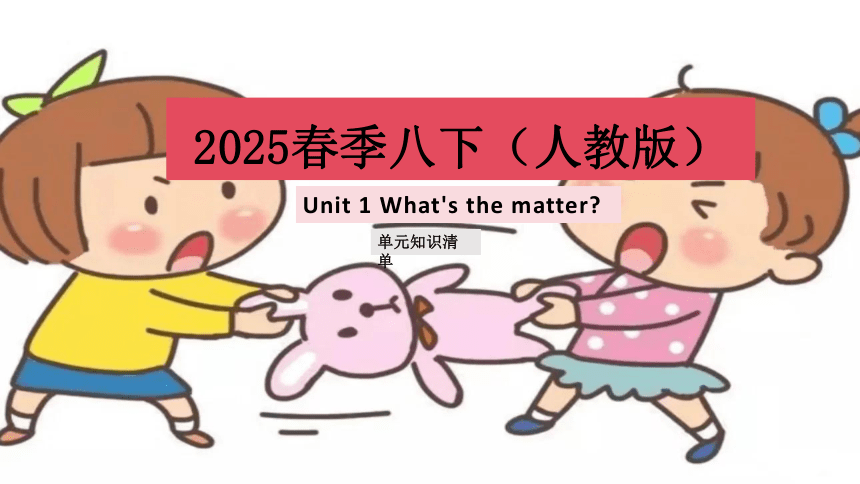
|
|
| 格式 | pptx | ||
| 文件大小 | 12.3MB | ||
| 资源类型 | 试卷 | ||
| 版本资源 | 人教新目标(Go for it)版 | ||
| 科目 | 英语 | ||
| 更新时间 | 2025-04-21 08:17:23 | ||
图片预览

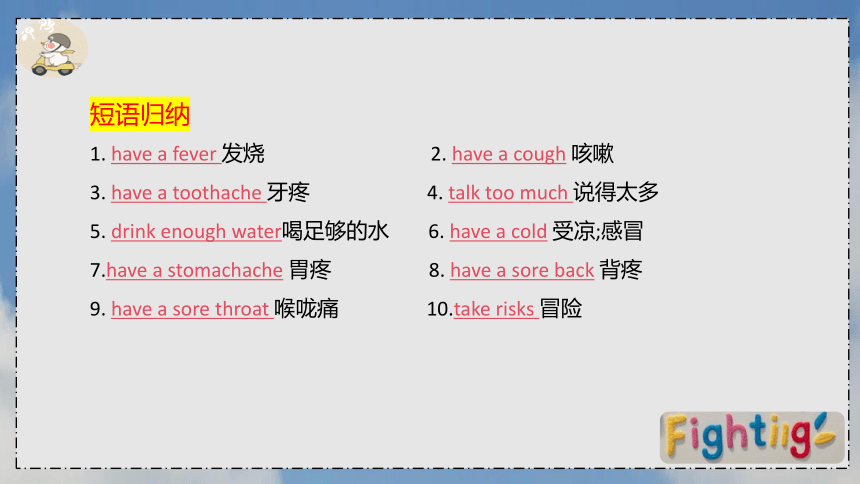
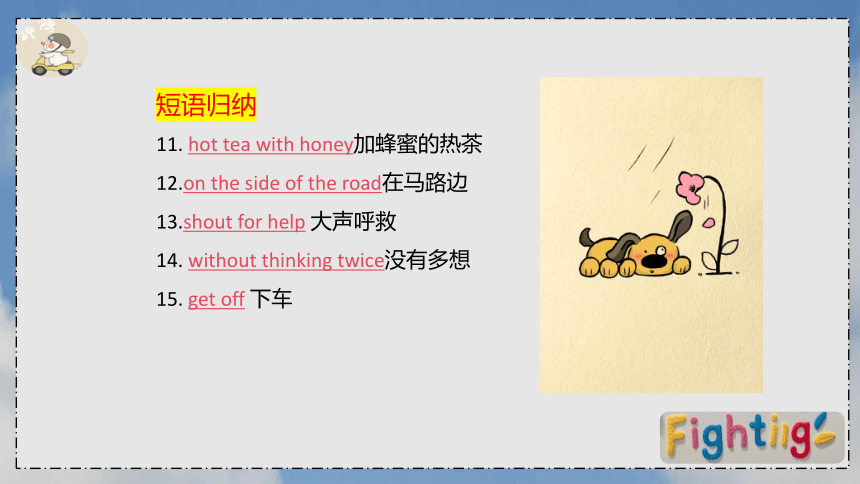

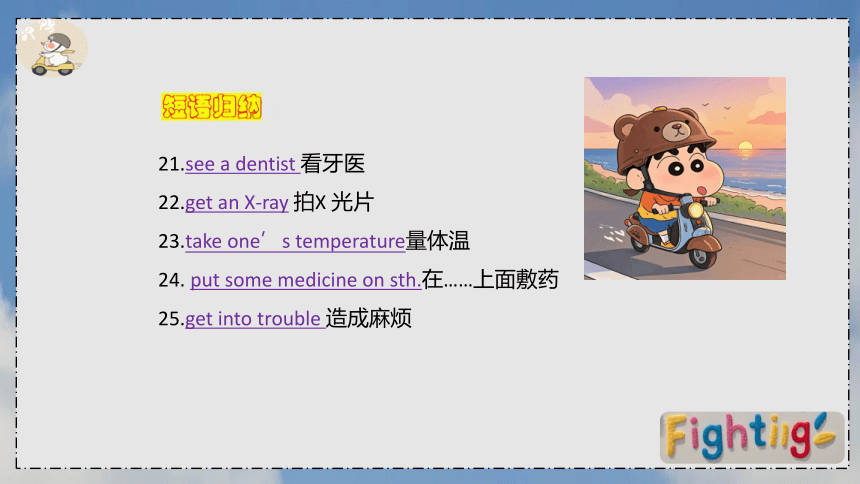
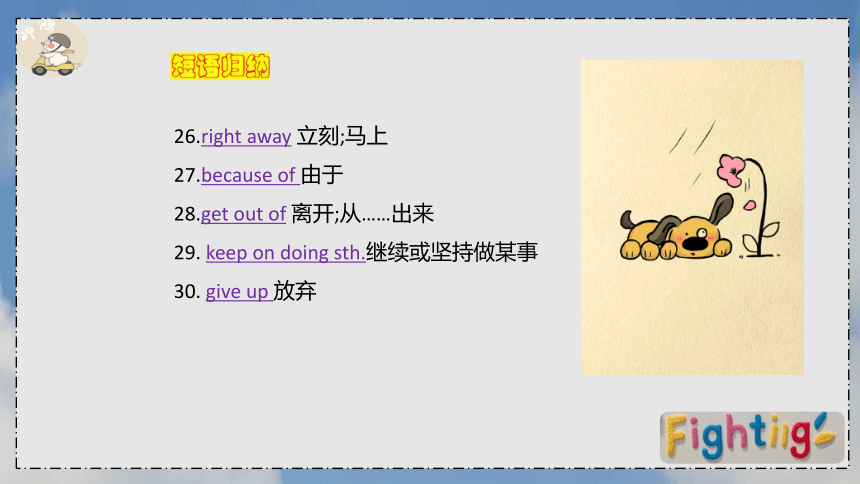
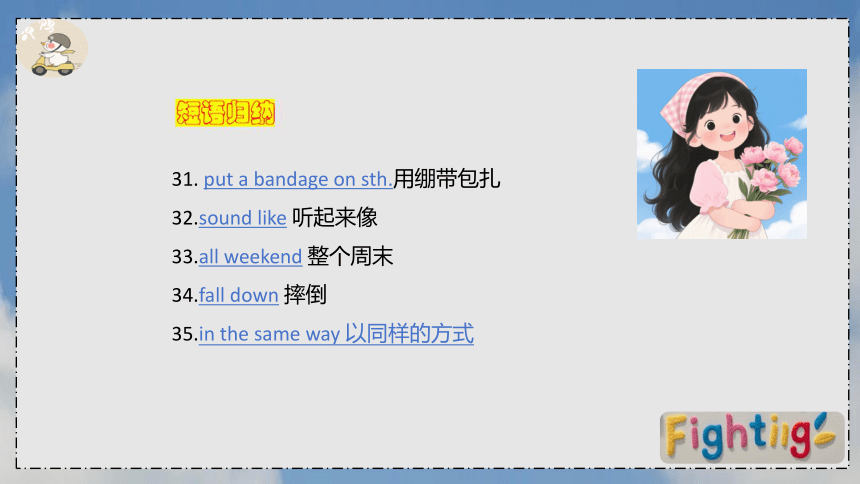
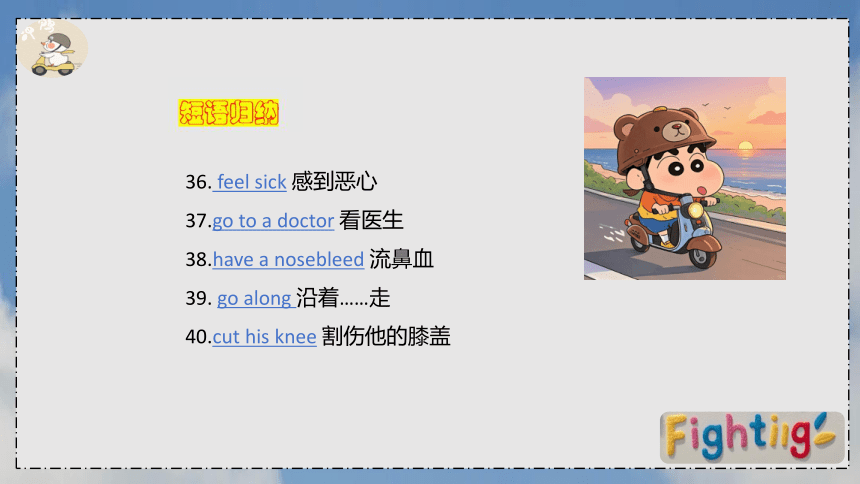
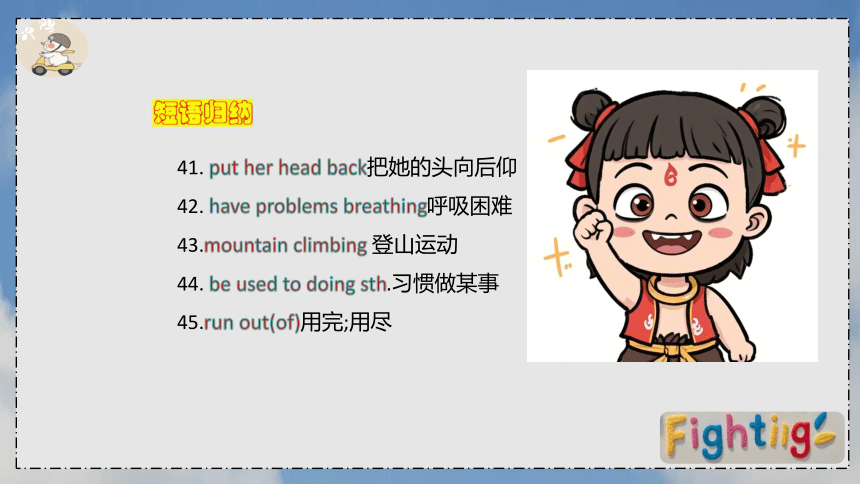
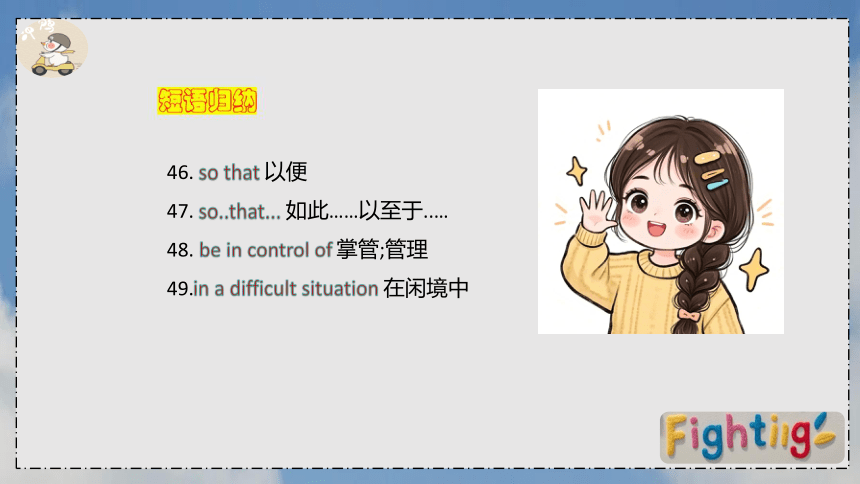
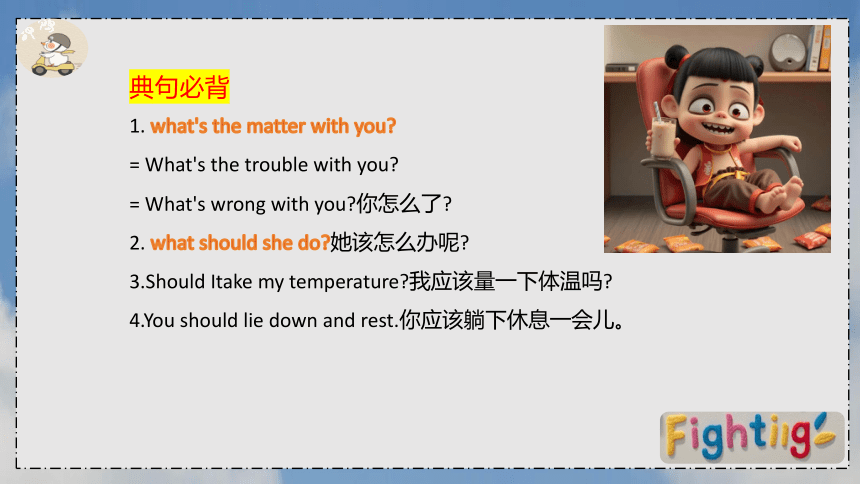

文档简介
(共37张PPT)
2025春季八下(人教版)
单元知识清单
Unit 1 What's the matter
短语归纳
1. have a fever 发烧 2. have a cough 咳嗽
3. have a toothache 牙疼 4. talk too much 说得太多
5. drink enough water喝足够的水 6. have a cold 受凉;感冒
7.have a stomachache 胃疼 8. have a sore back 背疼
9. have a sore throat 喉咙痛 10.take risks 冒险
短语归纳
11. hot tea with honey加蜂蜜的热茶
12.on the side of the road在马路边
13.shout for help 大声呼救
14. without thinking twice没有多想
15. get off 下车
短语归纳
16. have a heart problem有心脏病
17.to one’s surprise另某人惊讶的是
18.thanks to 多亏了;由于
19.in time 及时
20.make a decision 做出决定
21.see a dentist 看牙医
22.get an X-ray 拍X 光片
23.take one’s temperature量体温
24. put some medicine on sth.在……上面敷药
25.get into trouble 造成麻烦
26.right away 立刻;马上
27.because of 由于
28.get out of 离开;从……出来
29. keep on doing sth.继续或坚持做某事
30. give up 放弃
31. put a bandage on sth.用绷带包扎
32.sound like 听起来像
33.all weekend 整个周末
34.fall down 摔倒
35.in the same way 以同样的方式
36. feel sick 感到恶心
37.go to a doctor 看医生
38.have a nosebleed 流鼻血
39. go along 沿着……走
40.cut his knee 割伤他的膝盖
41. put her head back把她的头向后仰
42. have problems breathing呼吸困难
43.mountain climbing 登山运动
44. be used to doing sth.习惯做某事
45.run out(of)用完;用尽
46. so that 以便
47. so..that... 如此……以至于..…
48. be in control of 掌管;管理
49.in a difficult situation 在闲境中
典句必背
1. what's the matter with you
= What's the trouble with you
= What's wrong with you 你怎么了
2. what should she do 她该怎么办呢
3.Should Itake my temperature 我应该量一下体温吗
4.You should lie down and rest.你应该躺下休息一会儿。
典句必背
5. Do you think it comes from a newspaper or a book
你认为它是来自报纸还是书呢
6. I think I sat in the same way for too long without moving.我想我以同样的姿势一动不动地坐得太久了。
7. She said that the man had a heart problem and should goto the hospital. 她说这个人有心脏病应该去医院。
◆词汇讲解
have a cold
have a cold是动词短语,意为“患感冒,伤风”也可以说成catch a cold/get a cold或take a cold。其中have表示“患病,得病”,不能用于进行时态,但可与一段时间连用,表示状态;而catch/getacold则表示瞬时动作,不能同一段时间连用。
◆词汇讲解
have a cold
例如:I have had a cold for three days.我感冒三天了,此句也可以表达为:
I had/caught/got a cold three days ago.
【拓展】
表示人体某部位“痛”时的几种结构:
(1)havea+身体部位名词后加-ache构成。
例如:
have a headache 头痛 have a toothache 牙痛
have a stomachache胃痛
(2)have a sore+身体部位名词。
例如:
have a sore throat 喉咙痛
have a sore arm 胳膊痛
have a sore foot 脚痛
(3)身体部位+hurt/ache。
例如:
My eyes hurt. 我眼睛痛。
My legs ache.我腿疼。
(4)have a pain in/on+the + 身体部位。
例如:I have a pain in the arm.我胳膊痛。
(5)There is something wrong with + one’s+ 身体部位。
例如:There is something wrong with your eyes.
你的眼睛有毛病。
医疗行为短语
see a dentist 看牙医
I have to see a dentist because of my toothache.
(因为牙疼我得去看牙医。)
see a doctor 看医生
When you are sick, you should see a doctor.
(当你生病时,应该去看医生。)
医疗行为短语
take one's temperature 量体温
The nurse took my temperature and said it was normal.
(护士给我量了体温,说正常。)
医疗行为短语
get an X - ray 拍 X 光片
The doctor asked me to get an X - ray to check my leg.
(医生让我拍 X 光片检查我的腿。)
take some medicine 吃一些药
Remember to take some medicine three times a day.
(记得一天吃三次药。)
动作短语
lie down and rest 躺下休息
You should lie down and rest if you are tired.
(如果你累了,应该躺下休息。)
fall down 摔倒
The little boy fell down and hurt his knee.
(小男孩摔倒了,伤到了膝盖。)
动作短语
get on 上车
Let's get on the bus quickly.
(我们快点上车吧。)
get off 下车
Don't forget to get off at the next stop.
(别忘了在下一站下车。)
get out of 离开;从…… 出来
He got out of the car and walked into the house.
(他从车里出来,走进了房子。)
go to a doctor 去看医生,同 see a doctor 。
shout for help 大声呼救
The man shouted for help when he was in danger.
(那个人遇到危险时大声呼救。)
talk too much/a lot 说得太多
Don't talk too much in class.
(课堂上不要说太多话。)
三、重点句型
What's the matter with... 询问某人或某物怎么了,
相当于 What's wrong with... 或 What's the trouble with...
What's the matter with you (你怎么了?)
回答可以是 I have a headache.(我头疼。)等描述疾病或问题的句子。
三、重点句型
2.need to do sth. 需要做某事,人作主语时,
need 是实义动词,有形式变化。
You need to clean your room.(你需要打扫你的房间。)
He needs to buy some books.(他需要买一些书。)
三、重点句型
3.agree to do sth. 同意做某事
They agreed to help us.(他们同意帮助我们。)
4.expect sb. to do sth. 期待某人做某事;预料某人会做某事
We expect him to come on time.(我们期待他准时到来。)
三、重点句型
5.It is + adj. + that 从句... 是…… 的。
It is important that we should learn English well.(我们学好英语很重要。)
have problems (in) doing sth. 做某事有困难,in 可以省略。
I have problems (in) solving this math problem.(我解这道数学题有困难。)
6.mind doing sth. 介意做某事
Would you mind opening the window (你介意打开窗户吗?)
7.see sb. doing sth. 看见某人正在做某事 ;
see sb. do sth. 看见某人做了某事 / 看见某人经常做某事
I saw him playing basketball on the playground.
(我看见他正在操场上打篮球。)
I often see him go to school on foot.
(我经常看见他步行去上学。)
四、重点语法
(一)情态动词 should 的用法
情态动词 should 意为 “应该,应当” ,无人称、数和时态的变化,后跟动词原形。其否定形式是 shouldn't,意为 “不应该”。
表示建议或劝告
You should go to bed early.(你应该早点睡觉。)
We shouldn't eat too much junk food.(我们不应该吃太多垃圾食品。)
四、重点语法
(一)情态动词 should 的用法
2.用于提出意见或请求
Should I take this medicine
(我应该吃这种药吗?)
You should help your parents with housework.
(你应该帮父母做家务。)
四、重点语法
(二)反身代词的用法
反身代词是表示 “某人自己” 的代词,如 myself(我自己)、yourself(你自己)、himself(他自己)、herself(她自己)、itself(它自己)、ourselves(我们自己)、yourselves(你们自己)、themselves(他们自己)。
四、重点语法
(二)反身代词的用法
作宾语
He teaches himself English.(他自学英语。)
The little girl can dress herself.(小女孩能自己穿衣服。)
2.作同位语,用来加强语气
I myself will go there.(我自己将去那里。)
The students themselves cleaned the classroom.
(学生们自己打扫了教室。)
(三)while 与 when 引导时间状语从句的区别
when
既可以指 “时间点”,也可以指 “时间段”,从句中的动词可以是短暂性动词,也可以是延续性动词。
When I got home, my mother was cooking.
(当我到家时,妈妈正在做饭。)got 是短暂性动词
When he was a child, he liked reading.
(当他是个孩子时,他喜欢读书。)was 是延续性动词
(三)while 与 when 引导时间状语从句的区别
2.while
只能指 “时间段”,强调主句和从句的动作同时发生,从句中的动词必须是延续性动词。
While I was reading, my sister was watching TV.
(我读书的时候,妹妹在看电视。)reading 和 watching 都是延续性动词
He fell asleep while he was listening to music.
(他听音乐的时候睡着了。)listening 是延续性动词
五、写作训练(建议信)
假设你的朋友 Tom 胃疼,给他写一封建议信,包含至少三条建议(用 should/could)。
Dear Tom,
I'm sorry to hear that you have a stomachache. Here are some suggestions for you.
First, you should lie down and rest for a while. It can help you feel better. Second, you could drink some hot water with honey. It's good for your stomach.
五、写作训练(建议信)
假设你的朋友 Tom 胃疼,给他写一封建议信,包含至少三条建议(用 should/could)。
Dear Tom,
Third, don't eat spicy food or cold drinks. They may make your stomachache worse. Also, you should see a doctor if the pain doesn't go away.
I hope you will get well soon.
Best wishes!
Your friend,
[Your Name]
See you!
2025春季八下(人教版)
单元知识清单
Unit 1 What's the matter
短语归纳
1. have a fever 发烧 2. have a cough 咳嗽
3. have a toothache 牙疼 4. talk too much 说得太多
5. drink enough water喝足够的水 6. have a cold 受凉;感冒
7.have a stomachache 胃疼 8. have a sore back 背疼
9. have a sore throat 喉咙痛 10.take risks 冒险
短语归纳
11. hot tea with honey加蜂蜜的热茶
12.on the side of the road在马路边
13.shout for help 大声呼救
14. without thinking twice没有多想
15. get off 下车
短语归纳
16. have a heart problem有心脏病
17.to one’s surprise另某人惊讶的是
18.thanks to 多亏了;由于
19.in time 及时
20.make a decision 做出决定
21.see a dentist 看牙医
22.get an X-ray 拍X 光片
23.take one’s temperature量体温
24. put some medicine on sth.在……上面敷药
25.get into trouble 造成麻烦
26.right away 立刻;马上
27.because of 由于
28.get out of 离开;从……出来
29. keep on doing sth.继续或坚持做某事
30. give up 放弃
31. put a bandage on sth.用绷带包扎
32.sound like 听起来像
33.all weekend 整个周末
34.fall down 摔倒
35.in the same way 以同样的方式
36. feel sick 感到恶心
37.go to a doctor 看医生
38.have a nosebleed 流鼻血
39. go along 沿着……走
40.cut his knee 割伤他的膝盖
41. put her head back把她的头向后仰
42. have problems breathing呼吸困难
43.mountain climbing 登山运动
44. be used to doing sth.习惯做某事
45.run out(of)用完;用尽
46. so that 以便
47. so..that... 如此……以至于..…
48. be in control of 掌管;管理
49.in a difficult situation 在闲境中
典句必背
1. what's the matter with you
= What's the trouble with you
= What's wrong with you 你怎么了
2. what should she do 她该怎么办呢
3.Should Itake my temperature 我应该量一下体温吗
4.You should lie down and rest.你应该躺下休息一会儿。
典句必背
5. Do you think it comes from a newspaper or a book
你认为它是来自报纸还是书呢
6. I think I sat in the same way for too long without moving.我想我以同样的姿势一动不动地坐得太久了。
7. She said that the man had a heart problem and should goto the hospital. 她说这个人有心脏病应该去医院。
◆词汇讲解
have a cold
have a cold是动词短语,意为“患感冒,伤风”也可以说成catch a cold/get a cold或take a cold。其中have表示“患病,得病”,不能用于进行时态,但可与一段时间连用,表示状态;而catch/getacold则表示瞬时动作,不能同一段时间连用。
◆词汇讲解
have a cold
例如:I have had a cold for three days.我感冒三天了,此句也可以表达为:
I had/caught/got a cold three days ago.
【拓展】
表示人体某部位“痛”时的几种结构:
(1)havea+身体部位名词后加-ache构成。
例如:
have a headache 头痛 have a toothache 牙痛
have a stomachache胃痛
(2)have a sore+身体部位名词。
例如:
have a sore throat 喉咙痛
have a sore arm 胳膊痛
have a sore foot 脚痛
(3)身体部位+hurt/ache。
例如:
My eyes hurt. 我眼睛痛。
My legs ache.我腿疼。
(4)have a pain in/on+the + 身体部位。
例如:I have a pain in the arm.我胳膊痛。
(5)There is something wrong with + one’s+ 身体部位。
例如:There is something wrong with your eyes.
你的眼睛有毛病。
医疗行为短语
see a dentist 看牙医
I have to see a dentist because of my toothache.
(因为牙疼我得去看牙医。)
see a doctor 看医生
When you are sick, you should see a doctor.
(当你生病时,应该去看医生。)
医疗行为短语
take one's temperature 量体温
The nurse took my temperature and said it was normal.
(护士给我量了体温,说正常。)
医疗行为短语
get an X - ray 拍 X 光片
The doctor asked me to get an X - ray to check my leg.
(医生让我拍 X 光片检查我的腿。)
take some medicine 吃一些药
Remember to take some medicine three times a day.
(记得一天吃三次药。)
动作短语
lie down and rest 躺下休息
You should lie down and rest if you are tired.
(如果你累了,应该躺下休息。)
fall down 摔倒
The little boy fell down and hurt his knee.
(小男孩摔倒了,伤到了膝盖。)
动作短语
get on 上车
Let's get on the bus quickly.
(我们快点上车吧。)
get off 下车
Don't forget to get off at the next stop.
(别忘了在下一站下车。)
get out of 离开;从…… 出来
He got out of the car and walked into the house.
(他从车里出来,走进了房子。)
go to a doctor 去看医生,同 see a doctor 。
shout for help 大声呼救
The man shouted for help when he was in danger.
(那个人遇到危险时大声呼救。)
talk too much/a lot 说得太多
Don't talk too much in class.
(课堂上不要说太多话。)
三、重点句型
What's the matter with... 询问某人或某物怎么了,
相当于 What's wrong with... 或 What's the trouble with...
What's the matter with you (你怎么了?)
回答可以是 I have a headache.(我头疼。)等描述疾病或问题的句子。
三、重点句型
2.need to do sth. 需要做某事,人作主语时,
need 是实义动词,有形式变化。
You need to clean your room.(你需要打扫你的房间。)
He needs to buy some books.(他需要买一些书。)
三、重点句型
3.agree to do sth. 同意做某事
They agreed to help us.(他们同意帮助我们。)
4.expect sb. to do sth. 期待某人做某事;预料某人会做某事
We expect him to come on time.(我们期待他准时到来。)
三、重点句型
5.It is + adj. + that 从句... 是…… 的。
It is important that we should learn English well.(我们学好英语很重要。)
have problems (in) doing sth. 做某事有困难,in 可以省略。
I have problems (in) solving this math problem.(我解这道数学题有困难。)
6.mind doing sth. 介意做某事
Would you mind opening the window (你介意打开窗户吗?)
7.see sb. doing sth. 看见某人正在做某事 ;
see sb. do sth. 看见某人做了某事 / 看见某人经常做某事
I saw him playing basketball on the playground.
(我看见他正在操场上打篮球。)
I often see him go to school on foot.
(我经常看见他步行去上学。)
四、重点语法
(一)情态动词 should 的用法
情态动词 should 意为 “应该,应当” ,无人称、数和时态的变化,后跟动词原形。其否定形式是 shouldn't,意为 “不应该”。
表示建议或劝告
You should go to bed early.(你应该早点睡觉。)
We shouldn't eat too much junk food.(我们不应该吃太多垃圾食品。)
四、重点语法
(一)情态动词 should 的用法
2.用于提出意见或请求
Should I take this medicine
(我应该吃这种药吗?)
You should help your parents with housework.
(你应该帮父母做家务。)
四、重点语法
(二)反身代词的用法
反身代词是表示 “某人自己” 的代词,如 myself(我自己)、yourself(你自己)、himself(他自己)、herself(她自己)、itself(它自己)、ourselves(我们自己)、yourselves(你们自己)、themselves(他们自己)。
四、重点语法
(二)反身代词的用法
作宾语
He teaches himself English.(他自学英语。)
The little girl can dress herself.(小女孩能自己穿衣服。)
2.作同位语,用来加强语气
I myself will go there.(我自己将去那里。)
The students themselves cleaned the classroom.
(学生们自己打扫了教室。)
(三)while 与 when 引导时间状语从句的区别
when
既可以指 “时间点”,也可以指 “时间段”,从句中的动词可以是短暂性动词,也可以是延续性动词。
When I got home, my mother was cooking.
(当我到家时,妈妈正在做饭。)got 是短暂性动词
When he was a child, he liked reading.
(当他是个孩子时,他喜欢读书。)was 是延续性动词
(三)while 与 when 引导时间状语从句的区别
2.while
只能指 “时间段”,强调主句和从句的动作同时发生,从句中的动词必须是延续性动词。
While I was reading, my sister was watching TV.
(我读书的时候,妹妹在看电视。)reading 和 watching 都是延续性动词
He fell asleep while he was listening to music.
(他听音乐的时候睡着了。)listening 是延续性动词
五、写作训练(建议信)
假设你的朋友 Tom 胃疼,给他写一封建议信,包含至少三条建议(用 should/could)。
Dear Tom,
I'm sorry to hear that you have a stomachache. Here are some suggestions for you.
First, you should lie down and rest for a while. It can help you feel better. Second, you could drink some hot water with honey. It's good for your stomach.
五、写作训练(建议信)
假设你的朋友 Tom 胃疼,给他写一封建议信,包含至少三条建议(用 should/could)。
Dear Tom,
Third, don't eat spicy food or cold drinks. They may make your stomachache worse. Also, you should see a doctor if the pain doesn't go away.
I hope you will get well soon.
Best wishes!
Your friend,
[Your Name]
See you!
同课章节目录
- Unit 1 What's the matter?
- Section A
- Section B
- Unit 2 I'll help to clean up the city parks.
- Section A
- Section B
- Unit 3 Could you please clean your room?
- Section A
- Section B
- Unit 4 Why don't you talk to your parents?
- Section A
- Section B
- Unit 5 What were you doing when the rainstorm came
- Section A
- Section B
- Review of Units 1-5
- Unit 6 An old man tried to move the mountains.
- Section A
- Section B
- Unit 7 What's the highest mountain in the world?
- Section A
- Section B
- Unit 8 Have you read Treasure Island yet?
- Section A
- Section B
- Unit 9 Have you ever been to a museum?
- Section A
- Section B
- Unit 10 I've had this bike for three years.
- Section A
- Section B
